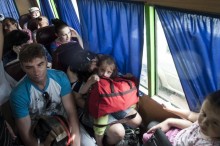The scope of the present forced relocation from the Donbas presents major social and economic challenges. In some regions, registered refugees make up 5 percent of the total population already. That is a lot, experts say, especially since about half of all refugees have not yet registered. Therefore, the real share of refugees may be as high as 10 percent. Experts compare our situation with that of Georgia in 2008, but it had just 3 percent of the population registered as refugees, and the main refugee flow lasted for 10 days only.
It is estimated that 800,000 residents of Donetsk and Luhansk oblasts were forced to change residence, even though the Interagency Coordination Center set the figure at 370,000 by early October, with one third of them being children, and 20 percent retirees and the disabled. Kharkiv oblast with 89,000, Donetsk oblast with 55,000, and Kyiv City with 34,000 house most refugees, while Zaporizhia, Luhansk, Dnipropetrovsk, and Odesa oblasts took a lot of them in as well. In addition, there is evidence of a return flow, numbering about 40,000 persons and coming mainly from Kyiv City.
Sociological surveys conducted by Kyiv International Institute of Sociology and studies done by Research & Branding Group in August 2014 showed that 57 percent of all refugees wished to return home. According to human rights activist Maksym Butkevych, most people that he managed to have a longer talk with planned to return to eastern regions, and even refugee Crimeans hope that Crimea will become Ukrainian again. However, they are in no hurry to return to it while the occupation continues.
“To analyze all the needs of refugees and identify necessary resources to meet these needs, the government has decided to establish a system of registration of such citizens. This will require financial and technical support of the international community. Ukraine sees experience of Georgia as particularly valuable in this context, as that country faced similar problems in the 1990s and 2000s,” Minister for Social Policy Liudmyla Denysova believes.
The reformist government which led Georgia in 2008 had a much better thought out approach to its refugees. For instance, 137,000 people left the warzone in the first 10 days after the beginning of the armed conflict in South Ossetia. To account for these citizens, the government established an on-line registration system, allowing it to analyze their needs. As a result, all refugees were counted, their immediate needs met, and possible abuse of state and donor support prevented. We are just going to do it.
According to experts, most migrants from the Donbas, amounting to 350,000-400,000 individuals, want to go home, while about 150,000 have adjusted to their new homes and are not going back. The current needs of refugees in their temporary places of residence range from temporary shelter and employment to health care provision and school places for their children. Meanwhile, just 12,000 have requested employment assistance at the employment centers as of early October.
In addition, psychologists emphasize that we have another threat on our hands, as the Ukrainians are splitting into “we” and “you.” There may be tension in the labor market due to increasing labor supply brought by refugee flows. The further challenges may include securing access to health care, including the provision of free medicines to refugees, the provision of preschool and school education, etc.
“A build-up of tension between refugees and permanent residents can be prevented by conducting outreach work via the media and social networks as well as in places of mass gatherings. It is necessary to involve refugees in public life in their temporary places of residence to prevent them being perceived as separatism-prone people only,” director of the Ptukha Institute of Demography and Social Studies Ella Libanova maintains.
There are two categories of problems facing refugees which the government must start solving already. The first of them comprises urgent needs, like resettlement to decent housing, provision of necessities, employment assistance, the prevention of outbreaks of infectious diseases and food poisoning, psychological support, and prevention of psychosocial conflicts. The second category will need to be resolved in the medium-term and will include employment assistance after returning to the Donbas, compensation for lost property, job creation, and rebuilding of infrastructure as part of the Donbas reconstruction program. Also, experts advise the government to treat those Ukrainians who have moved to Russia as our people until they renounce their Ukrainian citizenship.







